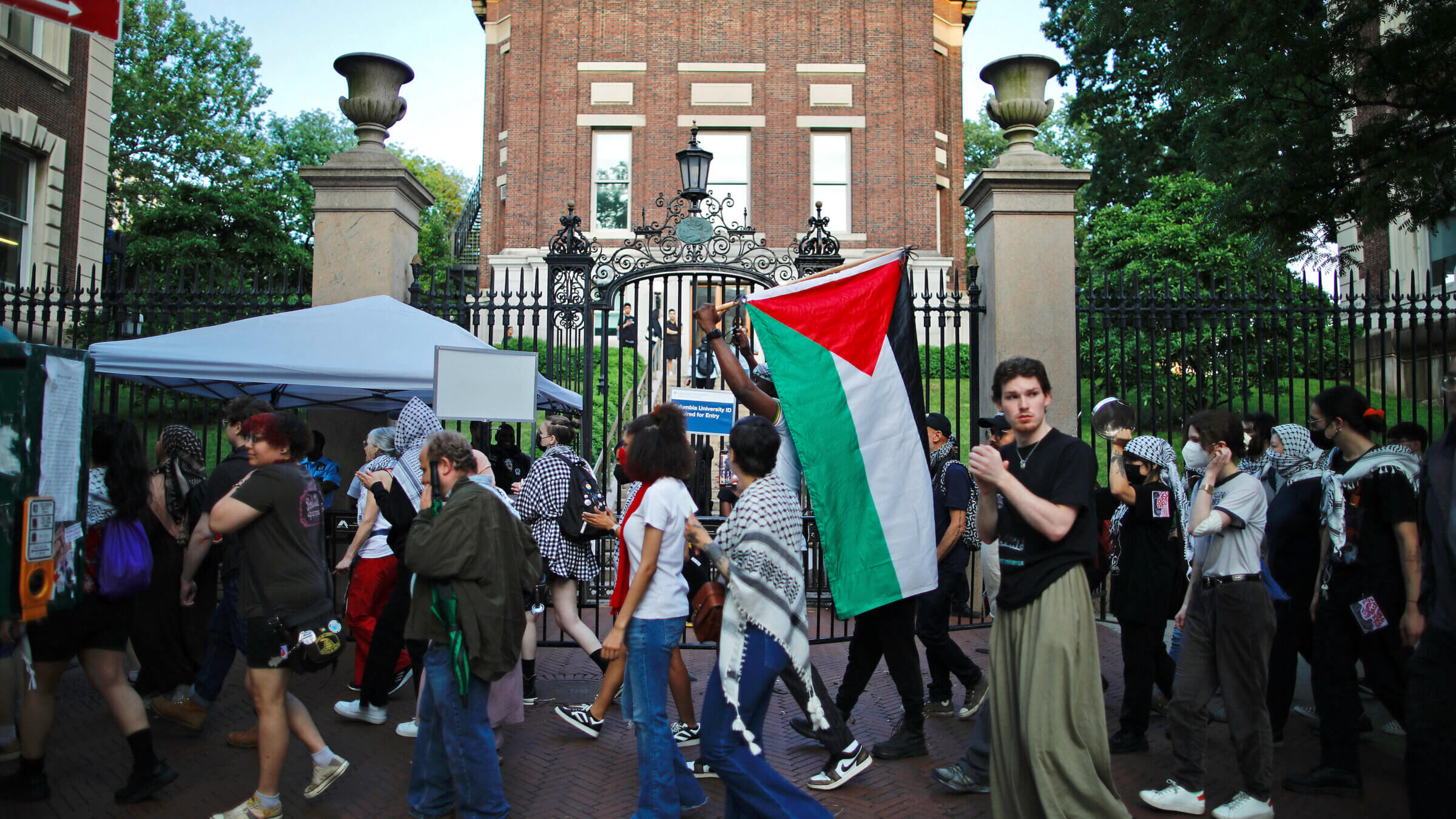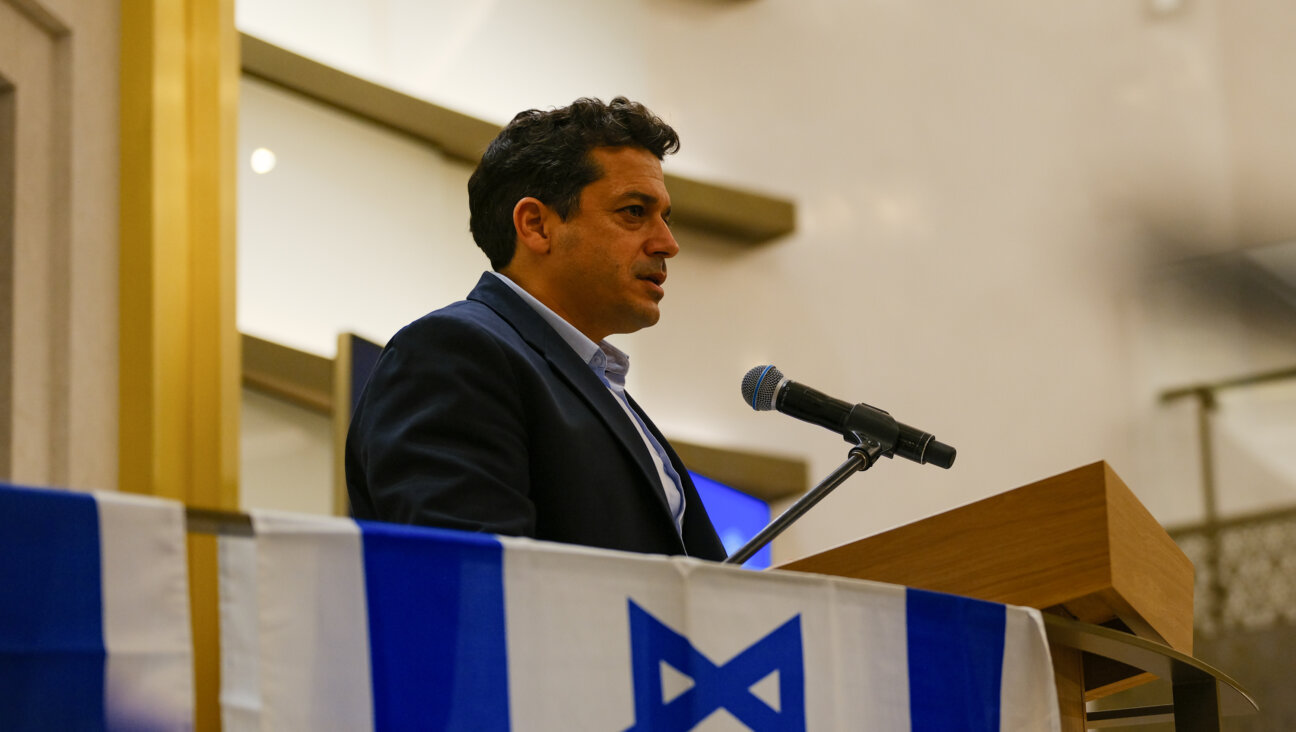Here’s what is missing from the Columbia antisemitism report
Columbia University’s antisemitism task force didn’t investigate the incidents shared with them, and struggled to grapple with an underlying problem

A May protest at Columbia University. Photo by Getty Images
“Antisemitism Notebook” is a weekly email newsletter from the Forward, sign-up here to receive the full newsletter in your inbox each Tuesday
Headlines over the weekend described the report from Columbia University’s task force on antisemitism as “damning,” revealing that Jewish students “were chased out of dorms, spat on, and pinned against walls,” while the school “failed to stop” what the authors called “crushing,” “severe and antisemitism.”
Though the 91-page document is all about Columbia, it can be understood as an account of the alienation and pain many Jewish students felt on many campuses last year. It is also, though, yet another exhibit in why it is so difficult to pin down the broad and vague idea of “campus antisemitism.”
Columbia’s task force is chaired by Esther Fuchs, David Schizer and Nicholas Lemann, all Jewish Columbia professors, and it defined antisemitism as “exclusion or discrimination based on Jewish identity or ancestry or real or perceived ties to Israel.”
Analyzing definitions of antisemitism always turns me into a pedant. But in an attempt to capture the full breadth of negative experiences that Jewish and Israeli students shared with the task force, its members wrote a definition that seems hopelessly overbroad. It would render all protests against actions by Israeli government officials as expressions of antisemitism, since those leaders, and their actions, would be targeted based on their “ties to Israel.”
The report’s authors did little to differentiate among the range of incidents that Jewish students shared with them. The report describes both “f—- the Jews” and “globalize the intifada” as “examples of hate speech reported by Israeli students.” But the first is a clear act of hate speech, if not harassment, directed at a group of people based on their identity and the second is a political chant. They’re not the same, even if they make some people feel similarly uncomfortable.
The task force drew most of its examples from listening sessions held on campus. But its members did not seem to try and corroborate — or even clarify — any of the incidents, acting something like stenographers for Jewish students who felt attacked and alienated.
For example, one Israeli student told Gil Zussman, an Israeli engineering professor at Columbia, that she overheard a health worker say “they would not treat her because she was Israeli.” Such a statement amounts to illegal discrimination, and should presumably lead to discipline or termination of the worker. But the report gives no indication that the accusation was passed on to authorities or investigated in any way.
It is, instead, presented without elaboration alongside more banal examples of offensive protest chants and strained friendships.
The authors also included incidents that occurred off campus, in the heavily Jewish Upper West Side, and is not always clear about which happened where. For example, they say that students reported being “pinned against walls” while walking to their dorms and synagogue, but doesn’t say whether this was inside Columbia’s gates (this incident is mentioned a second time in the report, but refers only to a single student, which is also confusing).
On one level, this kind of imprecision is maddening given the time and resources available to the task force and the stakes (the federal government is investigating allegations of antisemitism at Columbia and its president recently resigned over the issue).
But the report nonetheless provides a vital window into their lived experience.
Whether or not every anecdote in the report is precisely accurate — and they’re almost certainly not, as we all inadvertently oversimplify when recounting complicated events — they showcase a university where students and faculty are failing to grapple with the complexities of the Israeli-Palestinian conflict with deleterious impacts for many Jews on campus.
There was the leader of a thesis seminar who reportedly declared “I hate Israel” every time a student presented their project about Israeli artists. And the Israeli student who was kicked out of her dance club after she raised concerns about the group signing onto the coalition backing the Gaza protests. Widespread litmus tests — having to “constantly qualify who we are,” as one student put it — for joining student organizations; the leader of one club for queer students notoriously declared that “white Jewish people are today and always have been the oppressors of all brown people.”
Jewish students also reported being targeted over Israel’s actions in Gaza while wearing clothing or jewelry that marked them as Jews, as if that was enough for others to assume their political stance.
“Any expression of a connection to Israel — friends or relatives there, time spent in the country was enough to damage relationships with other students,” authors of the report wrote.
At the same time, the tone of the report — and sentiment from many of the Jewish students interviewed — seemed premised on the idea that opposition to the Israeli state is itself a form of antisemitism. “Anti-Zionism, as it has been expressed in campus demonstrations during the past academic year, hews far more closely to antisemitism than to a simple critique of Israel,” the authors write.
This stances means that the Columbia report ultimately — and rather tragically — struggled to grapple with the complexity of a growing reality of campus life: a lot of very liberal students, including many Jews, have come to view Israel as a pariah on par with, say, the police or Donald Trump or the billionaire class. And despite not appearing to subscribe to many explicitly antisemitic beliefs, the task force found that many of these students haven’t figured out how to express their anger toward Israel without catching innocent Jews in the crossfire.
But when examinations of the problem start from the premise that the protest movement is inherently antisemitic, and then layer on allegations that mix targeted harassment of Jewish students with disagreeable political slogans, they’re liable to get lost in the polarized fray that the the authors identify as a major source of the deteriorating campus climate.
















